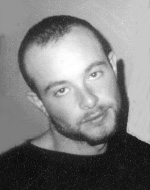Ben Tatiana and Michael. Was born on March 16, 1973 in Moscow, in the former Soviet Union, to a family of engineers. Dmitri came to the world to rejoice and delight others and was, by nature, a delicate and sensitive child, and the center of the family. He had a special closeness to his older sister, Katya, who had a governess, a teacher, and a friend. From early childhood, he opened up to literature, music, sports and art, which accompanied him all his life. At school he was a good student without preferences of human or real professions. At the end of his studies at the school he received a medal (medal). While in high school he received a driver’s license. He spent long summer vacations with his parents and friends on the Volga River, where Russia’s history and culture are very connected, and where Dmitri learned to swim. He liked to navigate the forest and collect mushrooms and berries. Even on his first leave from the army, he went to Volga to visit places he loved so much. His adolescence occurred against the background of the events of democratic changes in Russia – an abundance of information and new ideas. The restrictions and prohibitions of the Communist era have become a thing of the past. This atmosphere was different from the atmosphere of his parents’ adolescence, and contributed to building the character of an independent and free citizen, responsible for his fate, a man capable of dealing with important choices and decisions. It was difficult for him to choose a profession for academic studies, and finally he chose electronic engineering, because of the high academic level and universality of the profession. Dmitry was accepted to Moscow’s famous energy institute. During that period, his sister Katya and his beloved niece immigrated to Israel. In 1991, Dmitri arrived with his parents to visit Israel. Here he found a free and democratic state, a colorful landscape, a standard of living. During his visit to the Technion, where his friends from Russia studied, he met a high standard of study – all of these pointed to the possibility of independence and brought him to the thought of immigration. The events of August 1991 in Russia, which reinforced the feeling of instability, helped him formulate the decision, and in 1993, as part of the Agency’s program for academic students, Dmitry arrived in Israel. The first year of his stay in Israel was similar to that of many immigrants: a studio in Kibbutz Shoval, Hebrew study, preparations for university admission tests, meetings with his sister and niece, letters and telephones to Russia, work in the barn and odd jobs. In 1994, Dmitry successfully passed the entrance examinations to the University of Be’er Sheva, but decided to postpone his studies and enlist in the IDF in November, and was ready for combat service under difficult conditions. He wanted to be hard, “as hard as possible – better.” After two years of being an Israeli, he felt that he had something to defend in Israel On September 26, 1996, at the Netzarim junction, , With a small group of soldiers, against an armed Palestinian mob, which was the last day of his life: Dmitri was laid to rest at the cemetery in Kibbutz Barkai. He left behind his parents, a sister and a niece, and his parents wrote: “Are there goals in the world that are needed to get young people to die? They are the joy and support of their parents, they are the scientists and future engineers, they are future fathers. What are these goals, for which this future will not come true? The mind refuses to accept the logic and justification of such goals. The world is unjust. “
